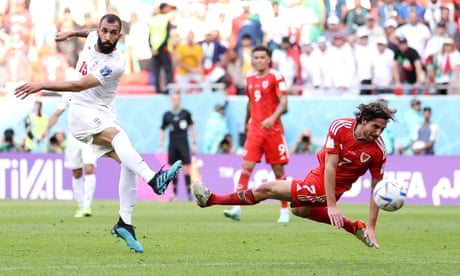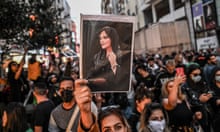Iran’s football team half-heartedly sang their national anthem at the start of their game against Wales after they had faced fierce criticism from government officials for failing to do so at the start of the game against England.
With their lips barely moving, the players had clearly collectively decided to sing the anthem, but the uncomfortable performance contrasted with the vigour that the Welsh players sang their anthem.
TV cameras cut to Iranians in the crowd in tears and even sobbing during the anthem. Many Iranians fans in Iranian colours but not waving the flag of the Islamic Republic booed the anthem, as did some Welsh fans. Some Iranians carrying a flag with the words ‘Women, Life, Freedom’ – a slogan of the protests that began after the death of 22-year-old Mahsa Amini in police custody in September – were confronted in the stadium by security officials.

Some fans wore shirts with Amini’s name on the back.
A spokesperson for the organising supreme committee said Fifa rules prohibited items with “political, offensive, or discriminatory messages”.
The Iranian team has been under severe conflicting pressure with warnings at home from conservative politicians that the players may face consequences on their return to Iran if they did not sing the anthem. But backers of the protests have been seeking more unequivocal support for them by the players.
Iran’s state security forces moved quickly to capitalise on the patriotic mood following the victory over a 10-man Wales in extra time, with state news agencies running pictures of smiling security forces waving Iranian flags. The country’s president, Ebrahim Raisi, thanked the team for what he described as showing the sweetness of victory to the people. The Iranian foreign minister, Hossein Amir-Abdollahian, praised the team for what he called a glorious victory and for having made the people happy
But at the same time campaigners were battling to prevent the imminent execution of Majidrezah Rahnavard, a protester from Mashhad in north-east Iran who is accused of killing two members of the security forces. His supporters say he has not had a fair trial and he has clearly been beaten in jail.
Inside Iran, crowds also gathered at Friday prayers to protest against the regime, including in Zahedan, where dozens of protesters were killed in September by pro-government forces. More than 18,000 people, of whom 555 were students, have been arrested in different cities.
Carlos Queiroz, the team’s Portuguese manager, had before the match called on Iranian fans to stay away if they were not willing to support the team inside the stadium. At a press conference, Queiroz said of his players: “To make it seem that they are the only people who should be responsible for all the human problems of the world, I think you will agree that it is not fair.”
Quick GuideQatar: beyond the football
Show

It was a World Cup like no other. For the last 12 years the Guardian has been reporting on the issues surrounding Qatar 2022, from corruption and human rights abuses to the treatment of migrant workers and discriminatory laws. The best of our journalism is gathered on our dedicated Qatar: Beyond the Football home page for those who want to go deeper into the issues beyond the pitch.
Guardian reporting goes far beyond what happens on the pitch. Support our investigative journalism today.
Queiroz was singled out for booing by the Iranian fans, as was the striker Mehdi Taremi, who used a press conference to say the team had lost against England for non-football reasons and now wanted to focus on football alone.
In a sign of the pressure being placed on sportsmen and women in Iran, authorities on Thursday arrested a former Iranian team captain, Varia Ghafouri, who was accused of insulting and damaging the Iranian national team and propaganda against the regime.
Ghafouri, a Kurd and a member of the Khuzestan steel club, has been a strong supporter of the protests and outspoken in his defence of Iranian Kurds, telling the government on social media to stop killing Kurdish people.
The Iranian government has said it will ignore a UN human rights council vote initiated by Germany and Iceland to set up an independent inquiry into the state of human rights inside Iran. The UN will conduct the investigation without Iran’s cooperation.















